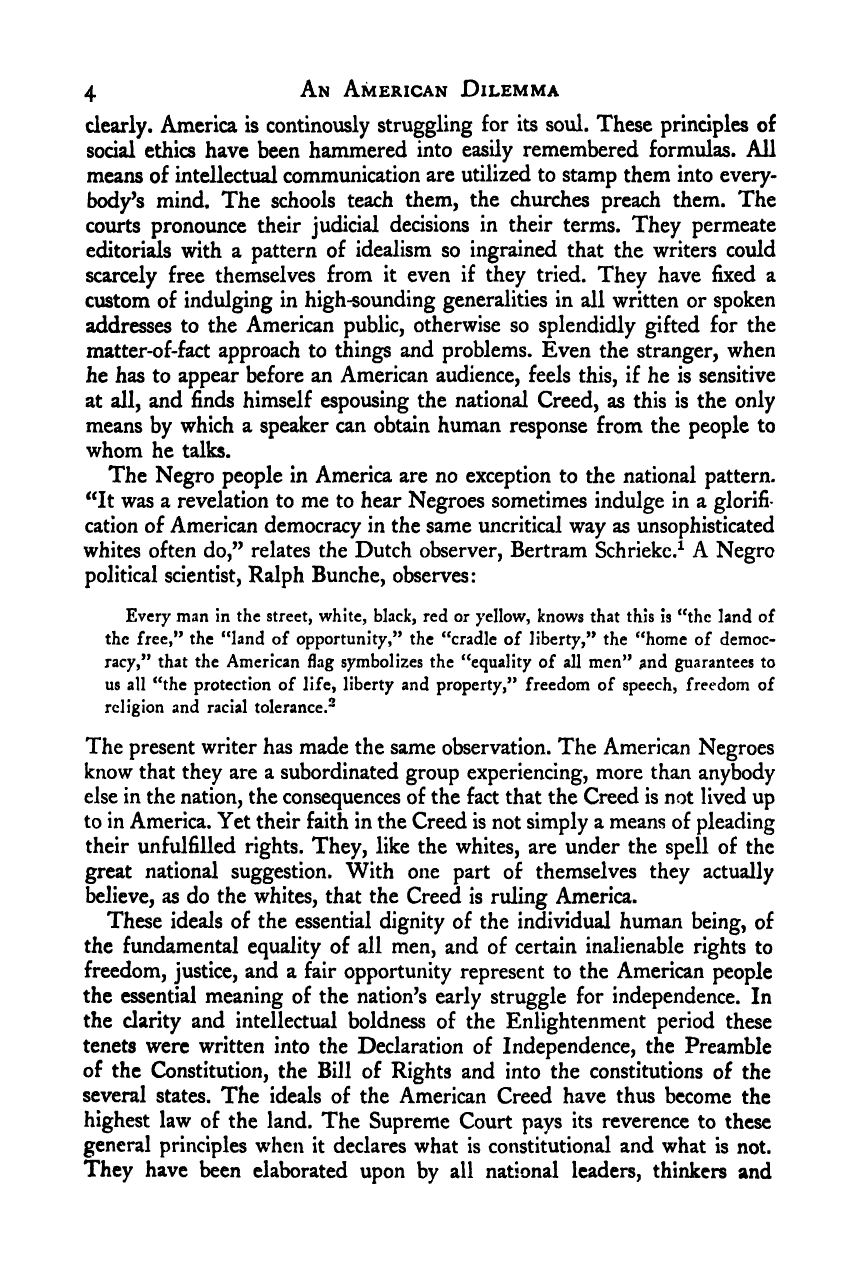Note: Gunnar Myrdal died in 1987, less than 70 years ago. Therefore, this work is protected by copyright, restricting your legal rights to reproduce it. However, you are welcome to view it on screen, as you do now. Read more about copyright.
Full resolution (TIFF) - On this page / på denna sida - I. The Approach - 1. American Ideals and the American Conscience - 1. Unity of Ideals and Diversity of Culture

<< prev. page << föreg. sida << >> nästa sida >> next page >>
Below is the raw OCR text
from the above scanned image.
Do you see an error? Proofread the page now!
Här nedan syns maskintolkade texten från faksimilbilden ovan.
Ser du något fel? Korrekturläs sidan nu!
This page has never been proofread. / Denna sida har aldrig korrekturlästs.
4 An American Dilemma
clearly, America is continously struggling for its soul. These principles of
social ethics have been hammered into easily remembered formulas. All
means of intellectual communication are utilized to stamp them into every-
body’s mind. The schools teach them, the churches preach them. The
courts pronounce their judicial decisions in their terms. They permeate
editorials with a pattern of idealism so ingrained that the writers could
scarcely free themselves from it even if they tried. They have fixed a
custom of indulging in high-sounding generalities in all written or spoken
addresses to the American public, otherwise so splendidly gifted for the
matter-of-fact approach to things and problems. Even the stranger, when
he has to appear before an American audience, feels this, if he is sensitive
at all, and finds himself espousing the national Creed, as this is the only
means by which a speaker can obtain human response from the people to
whom he talks.
The Negro people in America are no exception to the national pattern.
“It was a revelation to me to hear Negroes sometimes indulge in a glorifi’
cation of American democracy in the same uncritical way as unsophisticated
whites often do,” relates the Dutch observer, Bertram Schriekc.^ A Negro
political scientist, Ralph Bunche, observes:
Every man in the street, white, black, red or yellow, knows that this is ‘’the land of
the free,” the “land of opportunity,” the “cradle of liberty,” the “home of democ-
racy,” that the American flag symbolizes the “equality of all men” and guarantees to
us all “the protection of life, liberty and property,” freedom of speech, freedom of
religion and racial tolerance.-
The present writer has made the same observation. The American Negroes
know that they are a subordinated group experiencing, more than anybody
else in the nation, the consequences of the fact that the Creed is not lived up
to in America. Yet their faith in the Creed is not simply a means of pleading
their unfulfilled rights. They, like the whites, are under the spell of the
great national suggestion. With one part of themselves they actually
believe, as do the whites, that the Creed is ruling America.
These ideals of the essential dignity of the individual human being, of
the fundamental equality of all men, and of certain inalienable rights to
freedom, justice, and a fair opportunity represent to the American people
the essential meaning of the natlon^s early struggle for independence. In
the clarity and intellectual boldness of the Enlightenment period these
tenets were written into the Declaration of Independence, the Preamble
of the Constitution, the Bill of Rights and into the constitutions of the
several states. The ideals of the American Creed have thus become the
highest law of the land. The Supreme Court pays its reverence to these
general principles when it declares what is constitutional and what is not.
They have been elaborated upon by all national leaders, thinkers and
<< prev. page << föreg. sida << >> nästa sida >> next page >>